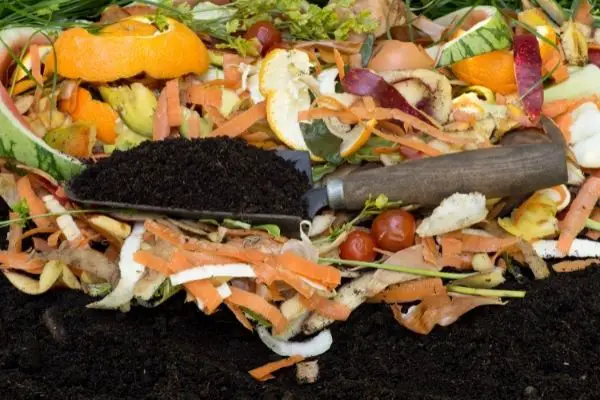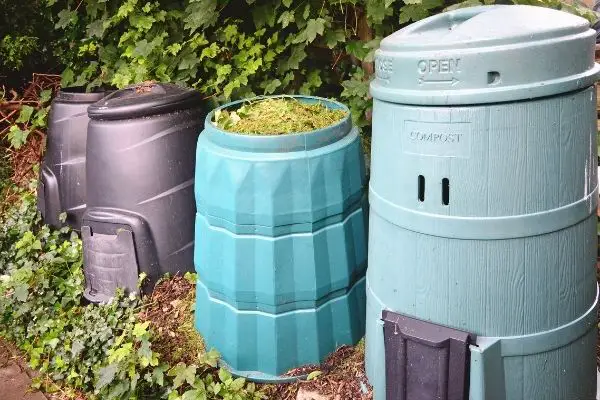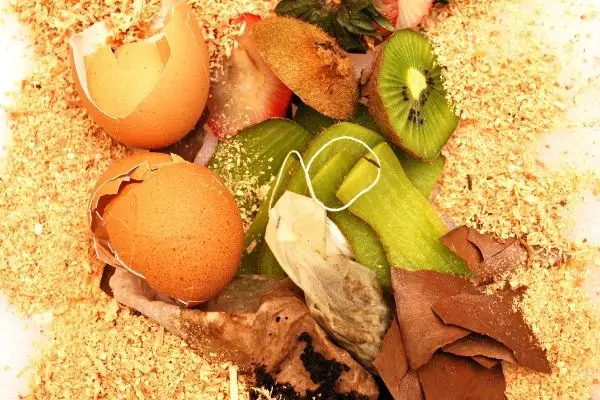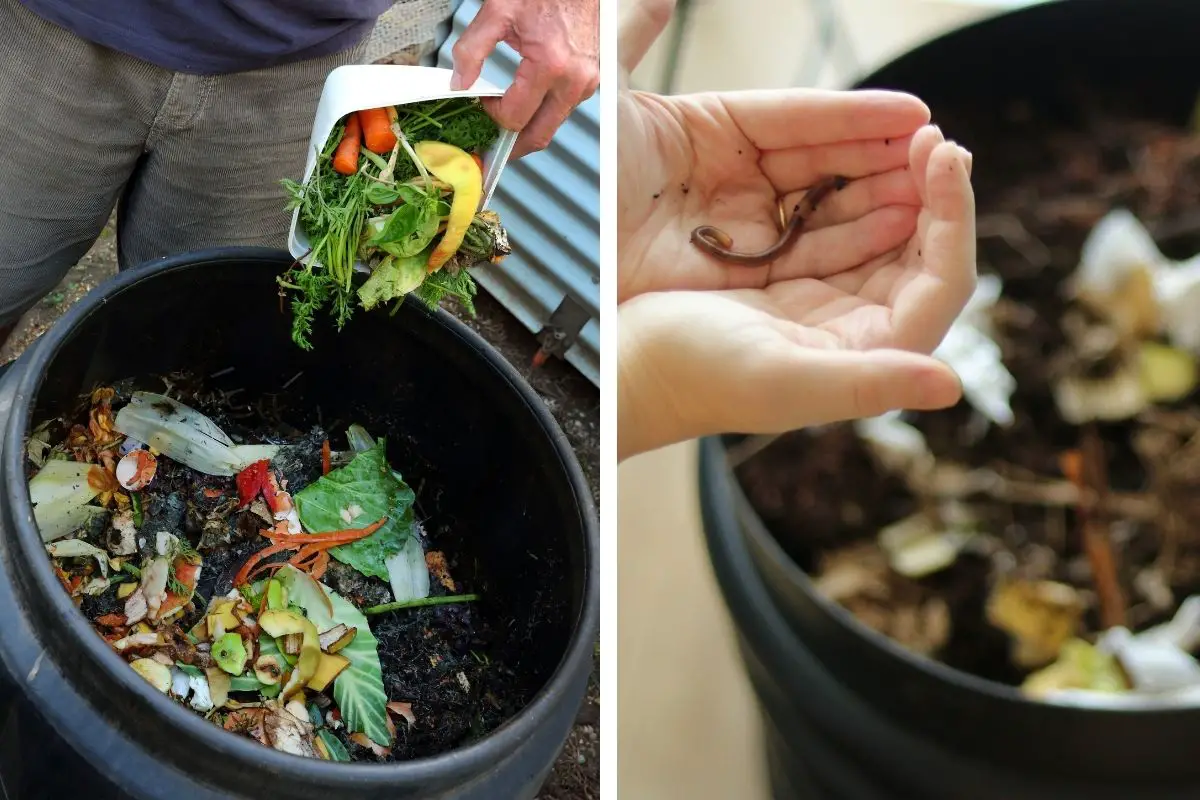Compost Bin vs Worm Farm – Which is Better?
There are several ways to produce nutrient-rich compost for the garden. The hard part is knowing which method is best for your needs.
In a lot of cases – myself included, you may find that a combination of methods is the way to go.
Most gardeners turn to a compost pile, stationary bin, or tumbler when first starting out. But a worm farm is an efficient, low-maintenance alternative that rivals even the best composting bin.

What is Composting?
Left to its own devices, all organic matter will eventually decompose and return to the earth. Composting takes advantage of this natural process to break down household waste (food scraps, lawn debris, etc.) as efficiently as possible.
Compost is produced by beneficial bacteria that turn old food, plant matter, and animal waste into nutrient-rich fertilizer. Some human intervention is necessary — but the microbes do most of the work!
What is Vermicomposting?
Vermicomposting is a subcategory of composting that uses live worms to break down organic waste even faster. Like traditional composting, vermicomposting produces an extremely rich fertilizer.
Vermicomposting typically takes place in a worm farm or worm bin. But don’t let the term ”farm” fool you. Vermicomposting is just as simple as regular composting.
A worm farm is a largely self-sufficient operation. The worms survive off of the fresh organic waste that is added to the bin. In turn, the worms produce castings (a technical word for worm poop) that can be used as fertilizer.
Pros of Using a Compost Bin
1. Large Capacity
Traditional composting is the best way to process large amounts of organic matter and turn it into usable fertilizer. While composting can take several months to produce finished fertilizer, there are few limits to how much compost you can process at one time.

2. Easy To Start
One of the best things about traditional composting is that it’s easy to get started. There’s no need for fancy equipment or special supplies. Just start adding kitchen scraps and lawn waste to your compost bin and watch the magic happen.
3. No Creepy-Crawlies
Rest assured, we love worms and all other beneficial organisms found in the soil. But not everyone shares that sentiment!
If you just can’t get past the thought of keeping worms under your kitchen sink or in your garden shed, traditional composting is definitely the best option.
Keep in mind that wild worms can still find a way to enter some composting systems. Opt for an enclosed bin or tumbler for the most protection against these intruders.
Pros of Using a Worm Farm
1. Space Efficiency
Worm bins can be easily scaled up or down to fit your needs. The worms themselves will reproduce until the farm is at capacity — no need to keep an eye on your “livestock” numbers!
This makes vermicomposting ideal for those looking to start composting in an apartment or small home.
2. Indoor/Outdoor
Nearly all types of composting bins must be kept outside. The same isn’t true for worm bins.
Vermicomposting is extremely easy to set up indoors. The worms will keep foul odors at bay. And, since the worms dislike light, there’s no shame in keeping your worm bin underneath a cabinet or inside a dark closet.
3. Fast Decomposition
No matter the method, compost does not emerge overnight. But vermicomposting tends to produce significantly faster results than traditional composting.
At the end of the day, worms are hungry creatures and they will devour – and break down – your food scraps a lot faster than bacteria present in traditional compost!
4 Tips To Start Your Own Compost Bin Or Worm Farm
1. Prioritize Location
Whether you opt for a worm farm or compost bin, the right location is crucial. Worm bins should be kept in a cool, dark place to protect the worms inside from unlivable conditions. Traditional compost bins can be placed pretty much anywhere outdoors.
2. Invest in Quality Supplies
Setting up a compost bin or worm farm is incredibly easy if you have the right tools at your disposal. Many amateur gardeners opt to purchase a ready-made bin or worm farm kit when first starting out.
Remember: The best compost bin or worm farm is one that suits your household capacity and backyard space.
If you opt for a worm farm over traditional composting, be sure to source your live worms from a trustworthy seller.
3. Add Green and Brown Material
Compostable matter can be categorized as either green or brown. Green material — fresh grass cuttings, kitchen scraps, animal manure — is high in nitrogen. Brown material — paper, wood chips, dead leaves — is high in carbon.
There’s no real difference between filling a compost bin vs worm farm. Both require a healthy balance of green and brown organic waste to function properly.

4. Avoid Composting No-Nos
An incredible amount of household waste is compostable. But adding the wrong thing to your compost or worm farm could spell disaster.
Avoid composting or vermicomposting highly acidic or salty foods. Fatty foods like dairy, butter, and meat should also be avoided.
(Vermiculture tends to have a higher tolerance for some “forbidden” foods than traditional composting. However, you should always err on the side of caution).
Frequently Asked Questions
Which worm species is best for vermicomposting?
The two most popular types of worms for vermicomposting are red wigglers (Eisenia fetida) and redworms (Lumbricus rubellus). These species are perfectly suited to life in a worm bin and produce great fertilizer.
You shouldn’t just capture wild worms and add them to your worm farm. Not all worm species can survive in an enclosed environment or feed on food scraps alone. It’s best for both you and the worms to invest in one of the species mentioned above!
Is a worm farm better than a compost tumbler?
If your main reason for investing in a worm farm is the lack of routine maintenance, a compost tumbler may be another viable option to consider. Compost tumblers are much like stationary bins. But instead of sitting in one place, they can easily be rotated to mix and rotate the contents inside.
Aside from the lack of manual turning and aeration, compost tumblers share many of the same pros and cons as regular bins. So the choice of worm farm vs. compost tumbler largely comes down to the same factors.
Can you feed Bokashi pre-compost to worms?
The short answer is yes, however you will need to be careful. As Bokashi is pretty acidic, it is important to start with small doses. For more information, we recommend this article on Bokashi and wormeries.






